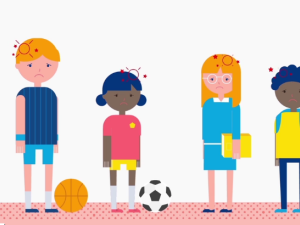New Activity-Tracking App Hints at Change to Recommendations for Concussed Children

By employing a new strategy to help physicians learn directly, in real time, how active their pediatric patients are during the days after they sustain a concussion, how the patients are feeling each day, and if the two are related, a team from the Perelman School of Medicine and The Children’s Hospital of Philadelphia found new insights that may change recommendations for treating concussion patients.
Via a new app, the authors monitored 34 patients aged 11 to 19 who had sustained a concussion; patients also wore accelerometers (a device worn at the waist to measure steps) to monitor physical activity. When prompted at a random time each day, patients reported how severe their concussion symptoms were. Each evening they reported how much time they spent on a computer, reading, watching TV, gaming, and performing other cognitive activities that day.
The research team found that symptoms generally decreased as the two-week follow-up time period progressed, while cognitive and physical exertion increased. They also found that patients who spent more time doing cognitive-based activities like reading or looking at a computer reported more severe symptoms on a particular day and on the next two days. On the other hand, higher physical activity on a particular day corresponded to a lower symptom score that day and the next two days, especially in subjects with low initial-symptom scores. Their conclusion: Prolonged rest, beyond the acute post-injury period, did not appear to add benefit—and it may actually be detrimental.
Read the article in JAMA Pediatrics.
Watch the video and read more about this research.